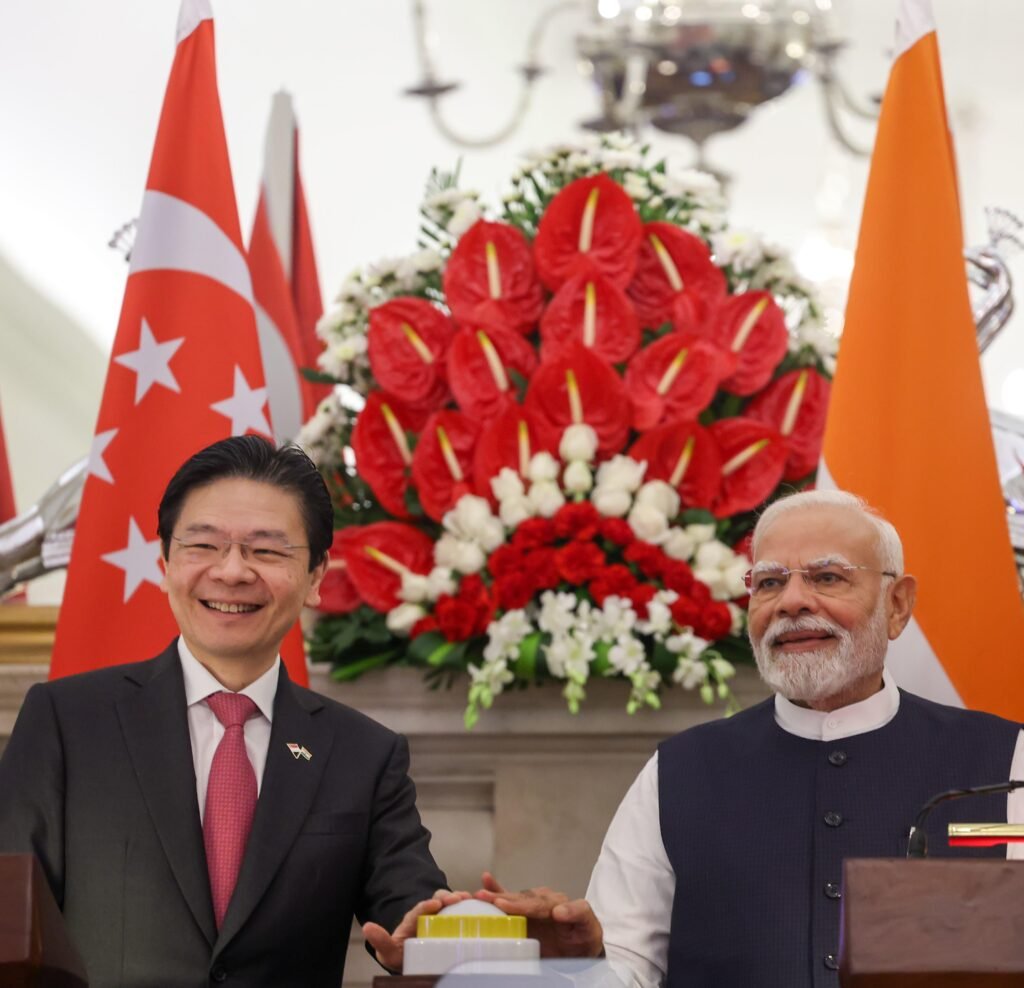India–Singapore Sign MoU on Green & Digital Shipping Corridor
PM Narendra Modi & PM Lawrence Wong Inaugurate JNPT’s BMCT-II, Boosting Capacity to 4.8 Million TEUs
Shipping Minister Sarbananda Sonowal exchanged MoU with Transport Minister Jeffrey Siow in presence of PM Narendra Modi & PM Lawrence Wong
“Under PM Modi’s leadership, we are building a future-ready maritime ecosystem that is green, globally competitive, and digitally empowered:” Union Minister Sarbananda Sonowal
New Delhi, September 4, 2025: India and Singapore today formalised their maritime partnership by signing a landmark Memorandum of Understanding (MoU) to establish the India—Singapore Green & Digital Shipping Corridor (GDSC).

The agreement was signed by Union Minister of Ports, Shipping & Waterways (MoPSW), Sarbananda Sonowal and Acting Transport Minister Jeffrey Siow in the presence of Prime Minister Narendra Modi and Singapore Prime Minister Lawrence Wong, underscoring the strategic importance both nations place on sustainable and digitally driven maritime trade.
The MoU aims to accelerate the transition of the maritime sector towards zero- or near-zero greenhouse gas emission fuels and to promote seamless digital integration across ports.

It covers cooperation in areas such as alternative marine fuel infrastructure, green hydrogen, e-methanol, shore-to-ship power systems, as well as the use of advanced digital technologies to enable real-time cargo and vessel management. Both countries will also collaborate on joint research and innovation in green maritime solutions.
Adding further weight to this maritime collaboration, the two Prime Ministers also jointly inaugurated the JN Port – PSA Mumbai Terminal (BMCT) Phase-II, developed by Singapore’s PSA International. This new phase will increase JNPT’s handling capacity to 4.8 million TEUs, reinforcing India’s status as a major player in global container trade. With dedicated DFC-ready rail links, 63 ICDs ensuring last-mile industrial connectivity, and a highly skilled workforce, the BMCT-II is set to accelerate India’s logistics growth and fuel regional prosperity.

Highlighting the significance of the partnership, Prime Minister Narendra Modi said in a Joint Press Statement, “Today’s agreement on Green & Digital Shipping Corridors will give significant momentum to the green fuel supply chain and digital port clearance in the maritime sector. India is working at great speed to strengthen its port infrastructure, and Singapore’s expertise in this field is of immense value.”
Union Minister Sarbananda Sonowal described the MoU as transformational, noting that it complements India’s ambitious maritime vision under Sagarmala, Maritime India Vision (MIV) 2030, and Maritime Amrit Kaal Vision (MAKV) 2047. He said, “This corridor will accelerate our joint efforts in decarbonising maritime trade and integrating cutting-edge digital technologies. Under PM Modi ji’s leadership, we are building a future-ready maritime ecosystem which is green, globally competitive, & digitally empowered.”
India brings to the partnership its rapidly expanding renewable energy capacity, manufacturing strength and emerging production hubs for alternative fuels. Singapore contributes its established role as a global hub port with advanced bunkering operations and digital port systems. Together, the two nations intend to create a model for green corridors that can serve as a template for other maritime partnerships across the world.
The corridor is expected to reduce trade costs significantly by streamlining port clearance through digital systems, while also helping to cut shipping-related emissions by up to 20% in pilot routes.
It aligns with global efforts to decarbonise shipping, which currently accounts for nearly 3% of worldwide emissions.
The agreement also carries strategic weight in the Indo-Pacific, linking India’s Act East Policy with Singapore’s position as a regional maritime hub. Both governments view the corridor, combined with the BMCT-II expansion, as a key step in strengthening ASEAN cooperation and advancing a shared vision of peace, stability, and sustainable growth in the region.
As part of the roadmap, India and Singapore will form joint working groups with industry, launch pilot projects in green fuel bunkering and digital integration, and showcase progress at the upcoming India Maritime Week 2025 in Mumbai.
Concluding the event, Union Minister Sarbananda Sonowal remarked, “The presence of both Prime Ministers at this signing underscores its importance. This is more than an MoU—it is a blueprint for the future of shipping, where trade is not only efficient but also sustainable.”




